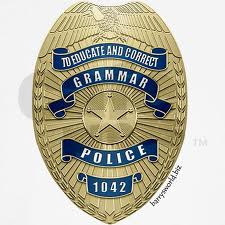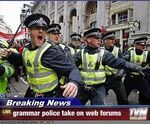Grammar Police
“Stop! Grammar time!”
His (or Her) Majesty's Grammar Police were formed in the early 19th Century in Britain as a response to the threat of insurrection posed by commoners taking liberties with Royal English.
The jurisdiction of the Grammar Police extends to the United States, where the cadre is regarded comparably to the Illuminati, a secret society that wields clandestine power over both government and society. Americans, who do not know the strings of power that the Illuminati pull, know even less about the rules of grammar by which the Grammar Police seek to dominate the working man.
Although members of the British Commonwealth are honour-bound to speak correct English as well, the Grammar Police basically don't pay much attention to anything they say.
English is said to be the only major language without a government-sponsored Academy to define meaning and correct usage, but this underestimates the great influence of the Grammar Police.
Credo[edit]
The Grammar Police adhere to a multi-pronged credo that holds that:
- It is a good thing to study didactic rules of grammar.
- Utterances that get the meaning across are simply not good enough.
- It is the finest thing of all to create drama over petty violations of the rules.
This credo inspired Barry Goldwater's fateful quip to the 1964 Republican Nominating Convention: "Extremism in the defense of pedantry is no vice; moderation in the pursuit of conformance is no virtue!" This would not be the first time that a candidate confronted charges of being extreme--by confirming them.
History[edit]
The 20th Century--a century of decay[edit]
The 20th Century was not an auspicious time for the Grammar Police. Although membership in England continued to rise, due to collapsing standards of education and drunken apathy, membership in the Scottish branch atrophied at the beginning of Britain's Soviet Era (the election to power of the British Labour Party), never to recover. The revered Illuminati itself was threatened by the credibility of the Grammar Police and worked to discredit their efforts to prescribe linguistic unity (a move known as The Final Conjugation).
Working with their colleagues in France (in English of course) the Grammar Police organised the Comrades' Committee For Linguistic Purity. They built underground connections all over Europe and exploited mercilessly the emerging European Economic Community for their own ends. English would be the unifying language of this new European empire and the enforcers would be them, in anti-slang riot gear if necessary.
The 21st Century--a rise to borderline relevance[edit]
The greatest challenge to the Grammar Police in the early years of the 21st century has been the 'texters' (or txtrs), those people who communicate in abbreviations and in a shared language of spelling short cuts, punctuation nightmares, and just bad English. It was a bloody and turgid time for the defenders of Correct English. But in 2010 the return to office of a Conservative coalition saw key Grammar Police apparatchiks reconnect with their old Illuminati colleagues in the British and European governments. By the early 2010s, with roots extending all over Western Europe and the United States--even to Texas--the Grammar Police controlled an annual operating budget larger than the entire wealth of the Southern Hemisphere or the founders of Google.
Current management[edit]
The current chair of the Grammar Police is Lynne Truss, formerly of BBC Radio 4 and the Women's League of Language Purity. She was educated at Tiffin Girls’ Grammar School in Kingston, surely the start of her unhealthy but lucrative obsession with grammar.
Before Truss was appointed, the job was offered to Edwin Newman, the author of Strictly Speaking, and also to New York Times columnist William Safire, both of whom had distinguished careers as linguistic killjoys. However, the Grammar Police has a militant Patrolmen's Organization, which reacted with snippiness to the 'colonial twang' of these alternatives. The matter was settled when each replied to the Grammar Police that he was dead and intended to remain so.
For the Grammar Police, Truss's book A Zero Tolerance Approach to Punctuation (Doesn't that take a hyphen?) operates as their essential text when dealing with transgressors. This tome starts by asserting that 'there is never a dull moment in the world of punctuation,' as there is probably never a dull moment either in the world of pimple-popping.
Truss went on to write a book subtitled The Utter Bloody Rudeness of the World Today. (That could use a comma or two.) Then, yet another one about sports journalism. She plans a magnum opus, or at least another really big book, tentatively titled Why Can't Everyone Use the Right God-damned Fork?



